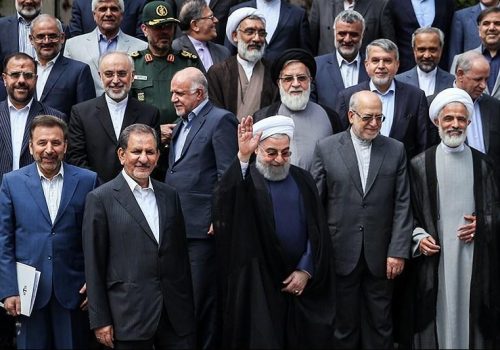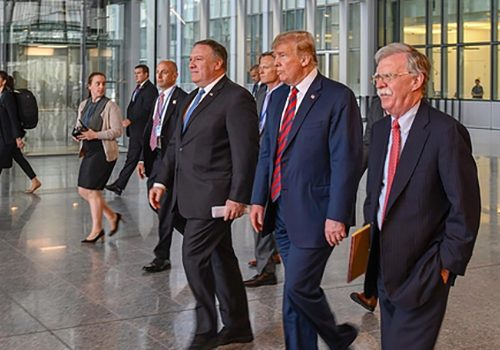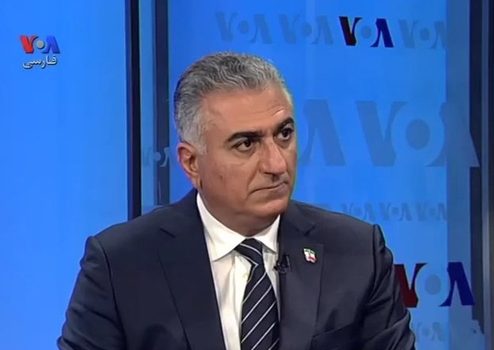US policy hinders positive ‘regime change’ in Iran
With the rare exception of a weekend prisoner swap, the record of US-Iran relations since the Trump administration came to office has been dismal both for the Iranian people and for US national interests.
A policy of undermining and then quitting the Joint Comprehensive Plan of Action (JCOPA)—topped by an embargo on the export of Iranian oil—has punished the Iranian people and provoked their government to commit more aggressive acts. Iran has put mines on tankers in the Persian Gulf, attacked Saudi Arabia’s main oil production facility and encouraged its proxies in Iraq to try to crush popular protests there. It has begun to move outside the limits of the JCPOA on its stockpile of low-enriched uranium, number and types of centrifuges and venue for enrichment as part of a policy of “maximum resistance” to US “maximum pressure.”
While Iran alone is responsible for its actions—especially the vicious crackdown on largely unarmed protestors that has reportedly killed hundreds of Iranians over the past few weeks—President Donald Trump’s policies have fed the paranoia of Iran’s security elite. These forces never trusted the United States and felt vindicated after the US unilaterally quit the JCPOA and imposed more sanctions despite Iran’s compliance with the deal.
Partly as a result of sanctions, which have pushed Iran into a deep recession, the Iranian government moved to lift subsidies on gasoline on November 15. When protests broke out, the usual suspects in Washington—neoconservative organizations and some in the Iranian diaspora—saw the demonstrations as the harbinger of another revolution. The “mullahs” were surely going down this time and their supporters would have to flee as millions of Iranians have done since the 1979 revolution.
But people power only goes so far in the Islamic Republic. Those in charge are hard men who made a revolution and remember that it succeeded in part because the Shah—who unbeknownst to most was dying of cancer—refused to order his military to keep mowing down unarmed people in the streets. The Shah and his entourage also had money in foreign banks and offers of refuge not available to Iran’s current rulers, who might not fancy spending the rest of their lives in Moscow, Caracas or Pyongyang.
Some proponents of regime change in Iran conflate the Islamic Republic with the old Soviet Union, which collapsed because of economic stagnation, imperial overreach and ideological brain death in 1991. However, US policy toward the Russians was very different and far more adept than the Trump administration’s approach toward Iran. It was a policy of “congagement” that competed successfully with the Soviet Union for external influence while negotiating with its leaders and promoting peaceful internal change through people-to-people ties and other tools of soft power.
In contrast, one of the Trump administration’s first acts was to impose a ban on the travel of most Iranians to the US that interrupted a successful program of academic exchanges and caused great suffering to Iranian Americans with relatives in Iran. Unlike Ronald Reagan, who told Soviet leader Mikhail Gorbachev to “tear down this wall” between East and West, Trump builds more walls against those who seek refuge in the United States. The Trump administration’s approach toward human rights has also been highly selective and inconsistent, with Trump praising authoritarian rulers in China, Russia, Turkey and Saudi Arabia, among others.
Unlike Ronald Reagan, who told Soviet leader Mikhail Gorbachev to “tear down this wall” between East and West, Trump builds more walls against those who seek refuge in the United States.
In terms of regional policy, the Trump administration has uncritically taken the side of the Emiratis, Saudis, and Israelis. The naïve hope appeared to be that the US could broker an anti-Tehran alliance that would also lead to Arab support for the “deal of the century”: a Palestinian-Israeli peace plan that has yet to be announced and is almost certain to be still-born if it ever materializes.
Trump’s decision to make his first foreign trip as president to Saudi Arabia emboldened the king’s rash and brutal son, Mohammad bin Salman. He has made a series of disastrous decisions that included authorizing the brutal murder of journalist Jamal Khashoggi, doubling down on a disastrous war in Yemen he launched in 2015 and boycotting the wealthy Arab state of Qatar. Trump’s affinity for the Saudis remains so extreme and inexplicable that he reflexively defended them—without waiting for an investigation—after a Saudi officer training at a US base in Pensacola, Fla. shot and killed three Americans.
The Saudis, however, realized that they could not count on American protection against Iran after the US did not retaliate when Tehran shot down an expensive American drone in June. There has also been no US kinetic response to the September attacks on Saudi oil facilities that temporarily put off-line half of Saudi oil production. Chastened by the US non-reaction, Riyadh and Abu Dhabi appear to be more willing to engage with Tehran, as well as the Houthi rebels previously tarred as Iranian proxies. US influence over the Arab world—from Syria to Yemen—is on the decline.
Amidst the incoherence of its Iran policy, the Trump administration did accede to an Iranian offer—facilitated by the Swiss and brokered by nongovernmental US negotiators—to exchange the hostage Princeton graduate student Xiyue Wang for an Iranian stem cell scientist, Massoud Soleimani, against whom sanctions violation charges were about to be dropped. This rare good news led Secretary of State Mike Pompeo to praise the “Iranian government” for its “constructive” attitude—a 180-degree change from Pompeo’s usual bashing of the Iranian “regime.”
President Trump, too, tweeted his thanks and reminded Iran of his willingness to make a new deal to replace the JCPOA (while inaccurately accusing the Obama administration of paying Iran billions of dollars for the release of previous hostages; the US was unfreezing Iran’s own assets). However, his administration has yet to offer concessions on sanctions that would make new talks politically feasible for the Iranian leadership—and likely infuriate Trump’s right-wing domestic political base. Instead, Iran remains a punching bag for Trump supporters while the US is a durable scapegoat for Iran’s ruthless rulers.
Humility is always in order when predicting politics in a country as complex and dynamic as Iran. But barring an unlikely diplomatic breakthrough, the only “regime change” Iran is likely to experience in the near future will be in the direction of more repression.
Barbara Slavin is director of the Future of Iran Initiative at the Atlantic Council. Follow her on Twitter: @BarbaraSlavin1.
Image: U.S. special representative on Iran Brian Hook listens as U.S. Secretary of State Mike Pompeo speaks to reporters before departing from al-Bateen Air Base in Abu Dhabi, United Arab Emirates September 19, 2019 (Reuters)


